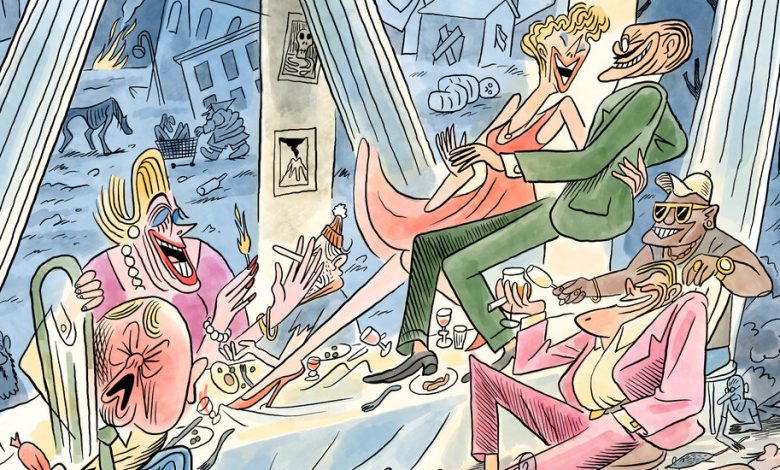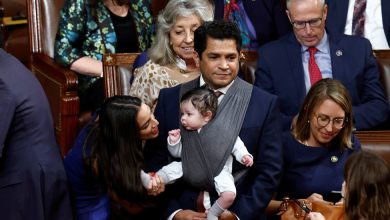These Days, the Very Rich Are Very Selfish. It Could Get Ugly.

Throughout much of the Western world’s history, the wealthiest have been viewed in their communities as a potentially unfavorable presence, and they have attempted to allay this sentiment by using their riches to support their societies in times of crises like plagues, famines or wars.
This symbiotic relationship no longer exists. Today’s rich, their wealth largely preserved through the Great Recession and the Covid-19 pandemic, have opposed reforms aimed at tapping their resources to fund mitigation policies of all kinds.
This is a historically exceptional development. Helping foot the bill of major crises has long been the main social function attributed to the rich by Western culture. In the past, when the wealthiest have been perceived to be insensitive to the plight of the masses, and especially when they have appeared to be profiteering from such plights (or have simply been suspected of doing so), society has become unstable, leading to riots, open revolts and anti-rich violence. As history has the unpleasant feature of repeating itself, we would do well to consider recent developments, including legislators’ inability to increase taxes on the rich, from a long-term perspective.
Let us begin with the consideration that the presence of very rich, or even superrich, individuals has always been somewhat troubling for Western societies. Medieval theologians regarded the rich as sinners and thought that the building of large fortunes should have been discouraged. At the very least, the rich were expected not to appear to be wealthy and to provide generous bequests to charitable institutions to the benefit of their souls.
But with time, as new economic opportunities in trade and in finance led to the accumulation of fortunes of unprecedented size, the increased presence of extremely wealthy individuals within the community could no longer be dismissed as an anomaly. From the 15th century, and beginning with the most economically developed areas of Europe such as central-northern Italy, the rich were assigned a specific social role: to act as private reserves of money into which the community could tap in times of dire need.
Nobody made this point better than the Tuscan humanist Poggio Bracciolini. In his treatise “De avaritia” (“On avarice”), completed in 1428, he argued thatcities that follow the tradition of instituting public granaries to build up food reserves should also be well provided of “many greedy individuals, in order … to constitute a kind of private barn of money able to be of assistance to everybody.”
There is abundant historical evidence that for centuries, across the West, the rich have dutifully fulfilled their role of “barns of money” in a variety of ways, which included accepting to pay exceptional taxes during crises or to provide loans to governments. Often, in early modern times, these were technically “forced” loans to ruling authorities, although the fact that they were not a prerogative of absolute monarchies but were also required, usually in wartime, by republican governments such as that of Venice should make us wary of considering them the mere expression of an arbitrary power. Indeed, the rich merchants who were the main “victims” of forced loans were also the rulers of patrician republics and understood they were contributing their private resources to the public good. For example, forced loans were imposed by Venice upon its richest citizens after the terrible plague of 1630 as well as to fund an exhausting war with the Ottoman Empire during 1645-69, although on both occasions the republic was able to raise much greater amounts from its own patricians by means of voluntary loans.
This is not altogether different from the patriotism with which many among the rich subscribed to various emergency loans during the World Wars, such as the Liberty Bonds issued in the United States in 1917-18 to contribute to funding the Allied war effort. These loans proved to be a poor investment, as the interest tended to become negative in real terms because of hyperinflation. But in the 20th century as in the 17th, the boundary between free choice and constriction was blurred, as governments welcomed any opportunity to increase the social pressure on those reluctant to contribute. Sometimes they went even further: In Britain in 1917 the chancellor of the Exchequer explicitly threatened the nation’s financiers with confiscation of company assets unless specified minimum amounts of capital were raised by a new, “voluntary” War Loan.
In the 20th century, the real novelty in how the rich were required to step up their wartime contribution was the expansion of progressive taxation, with substantial increases in the top rates of the personal income tax (in the United States the historical maximum was reached in 1944-45, at 94 percent for incomes over $200,000) and of estate or inheritance taxes. Of course, historically, wars provide the best possible motivation to ask citizens to contribute more: either with their blood or with their cash. But in the 20th century, also during peacetime economic crises, most notably the Great Depression of the 1930s, the rich were expected to contribute considerably more than the general population to foot the bill of public action. For example, this was explicit in the fiscal package introduced in the United States as part of Franklin Roosevelt’s New Deal.
In the past 15 years we have experienced the Great Recession, which in some countries also led to the sovereign debt crisis, followed by the worst pandemic in a century or so, then by an ongoing war in Ukraine and the looming threat of large-scale conflict in the Middle East. Based on history, one would expect that in this period the rich would have been called once again to fulfill their traditional role, and indeed, proposals of this kind have entered the political debate in many Western countries.
But so far, in most of them discussion has not been followed by action, and recent fiscal reforms appear to have done little to make the rich contribute more. Recent surveys of fiscal reforms by European countries in the wake of the Covid-19 pandemic show that increases in the top rates of the personal income tax or (where they exist) of wealth taxes have been rare and modest. In the United States, proposals by the Biden administration to increase taxation for the richest, such as the “billionaire minimum income tax,” have repeatedly failed to gather sufficient political support.
This is troubling, because the rich have stopped fulfilling the social role that has been their own for many centuries, making their position in society somewhat unclear.
Related to this, we should also consider whether the exceptional resilience of the rich to recent crises has been obtained in such a way as to make society as a whole less resilient — for the rich, protecting their fortunes from crises also involves protecting them from extra taxation, thus stripping public institutions of resources that could have been used for stronger mitigation policies, including those aimed at abating the sufferings (economic or otherwise) of the poorer strata. To some degree, governments compensated for this by expanding the public debt, which raises the question of who will repay it. Given the fact that many Western fiscal systems do not burden their wealthy to the same degree they once did, it seems probable that the bill for the Covid-19 crisis will weigh on the shoulders of the rich to an extremely low degree relative to the burden during past crises.
How could this be, since the public debate across Western countries strongly suggests that in perfect continuity with history, many (including a part of the rich, as shown by the “In Tax We Trust” campaign) considered it rather natural to ask the affluent to contribute more in these exceptional times? Another cultural constant in the history of the West is the widespread suspicion that if the richest components of society become involved directly in politics, they can exert an outsize influence on the political debate. This was clear in the Middle Ages, when across Europe many republican city governments tried to prohibit the richest families from gaining access to top public offices. And in the Modern Age this suspicion resurfaced regularly: Think of the debate about the growing concentration of economic and financial power in the United States in the first decades of the 20th century, leading to (largely bipartisan) worries that a few superrich individuals might have determined the national politics as well.
But today, in many Western countries the political involvement of the very affluent is basically taken for granted, and in some of them, superrich individuals have even become presidents or prime ministers: Silvio Berlusconi, who was first elected prime minister of Italy in 1994, is an early case. Perhaps the recent attempts to make the rich contribute more during crises have been exceptionally unsuccessful because the rich themselves are so exceptionally well positioned to influence policymaking. After all, as affirmed by many of the superrich, in absolute terms they already pay more taxes than anybody else — an argument that could have come straight from the mouth of a 17th-century Venetian patrician, were it not for the fact that a patrician would not have felt compelled to provide any justification for his privileged fiscal treatment.
If the rich have been actively trying to avoid being made to contribute more, then they might not be doing themselves (or anybody else) a favor. In many Western countries, the electoral success of parties with a clear anti-establishment, anti-rich character most likely arises from widespread anger at an economic (and political) elite perceived as self-centered and self-serving. Arguably, this is also because the rich have reneged on a centuries-old social contract, shutting the doors to their barns of money.
Guido Alfani is an economic history professor at Bocconi University in Milan and the author of the forthcoming book “As Gods Among Men: A History of the Rich in the West,” from which this is adapted.
The Times is committed to publishing a diversity of letters to the editor. We’d like to hear what you think about this or any of our articles. Here are some tips. And here’s our email: [email protected].
Follow The New York Times Opinion section on Facebook, Twitter (@NYTopinion) and Instagram.




